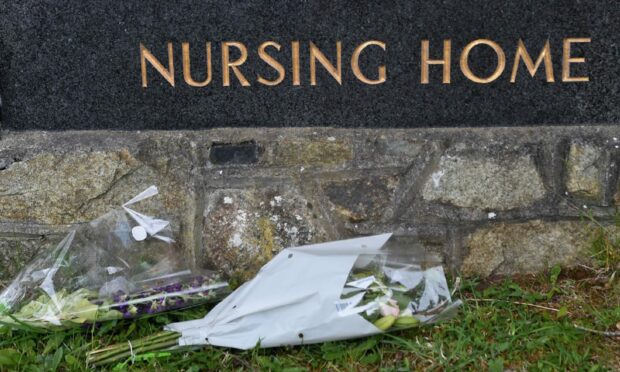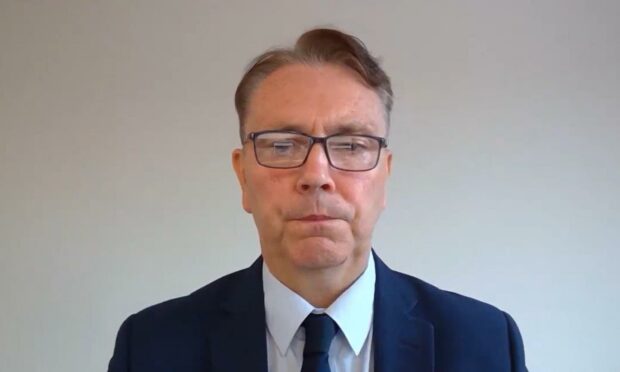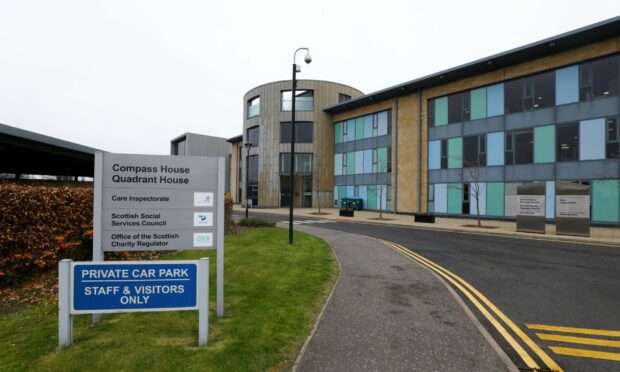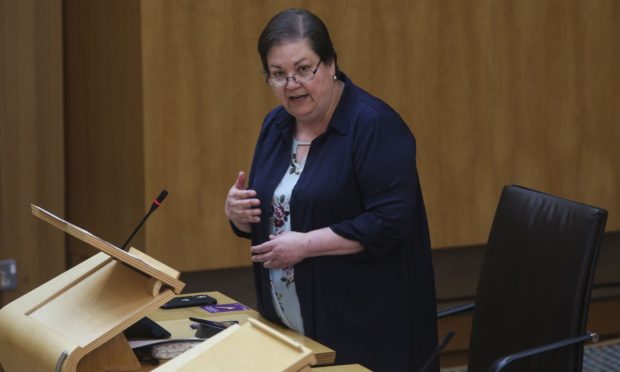The outgoing boss of Scotland’s care home watchdog has defied critics by defending what he called its “rapid” and “effective” response to the coronavirus pandemic.
Peter Macleod made the remarks as he prepares to retire as chief executive of the Care Inspectorate on Thursday.
He said it been a “real privilege” to lead the agency during its “most challenging” period.
But Scottish Labour’s deputy leader Jackie Baillie said his defence of the organisaton had failed to address “serious concerns” about its work.
The Dundee-based regulator has faced accusations it was “posted missing” during the pandemic after it stopped answering phone calls, conducting regular direct inspections and investigating many complaints.
Care home residents have accounted for 29% of the more than 10,000 Covid-19 deaths in Scotland during the pandemic.
Fatalities at care homes are the subject of an ongoing Crown Office investigation, and failings in the system are expected to be a key focus of a future public inquiry on Scotland’s response to the pandemic.
 We previously reported how the Care Inspectorate had shuttered its Dundee headquarters in March 2020 when the lockdown restrictions came into force, with all staff working from home and nobody manning its complaint hotline.
We previously reported how the Care Inspectorate had shuttered its Dundee headquarters in March 2020 when the lockdown restrictions came into force, with all staff working from home and nobody manning its complaint hotline.
Covid exposed many weaknesses in our care system, none more so than the Care Inspectorate.
Skye councillor John Gordon.
And it emerged last year that just 122 of the 2,316 complaints made to the regulator about care homes for older people were fully investigated in 2020-21 – a rate of 5%.
‘Right support at the right time’
However, in his final report to the Care Inspectorate board, Mr Macleod said the organisation had “galvanised” its resources in order to provide “the right support at the right time”.
He said: “We rapidly adapted our scrutiny and regulation approach in line with public health advice to ensure we continued to carry out our role effectively from the outset and throughout the pandemic.”
The 11-page report detailed a series of actions carried out to ensure the regulator was “effectively carrying out our role and achieving our aims over the past three years”.
Mr Macleod said: “My tenure over the past three years has been characterised by a rapid pace of work and an equally rapid adaptation of how the Care Inspectorate has worked in the face of Covid-19 and our response to it.”
He added: “I would like to pay tribute to all colleagues at the Care Inspectorate and across the sector who have worked so hard throughout the pandemic and have shown – and continue to show – dedication, compassion, professionalism and talent in caring for Scotland’s most vulnerable people.”
The Care Inspectorate has said that Mr Macleod, a Gaelic speaker from the Western Isles who is a graduate of Robert Gordon University in Aberdeen, was stepping down following a period of ill health.
He has been chief executive since January 2019, having previously served at Renfrewshire Council, where he was director of children and families services.
‘Extremely difficult circumstances’
Edith Macintosh, deputy chief executive and executive director of strategy and improvement, will become interim chief executive.
Care Inspectorate chairman Paul Edie praised Mr Macleod in his report to the board.
“His leadership during the pandemic, the most challenging time in the history of
the organisation, was hugely important,” he said.
“During that time, the organisation had to adapt to the extremely difficult circumstances and adjust the ways that we carried out scrutiny and assurance.”
Skye councillor John Gordon described a “tidal wave of issues” faced by families like his across Scotland who were affected by care home deaths during the pandemic.
His 83-year-old father, John Angus Gordon, was one of 10 residents who died at the Home Farm facility in Portree.
The Care Inspectorate raised a legal action to cancel the then operator HC-One’s registration following an inspection which raised serious concerns about the running of the home, which was later taken over by NHS Highland.
‘Not fit for purpose’
Councillor Gordon said: “Having met with John Swinney and Humza Yousaf a few times to discuss the public inquiry and the terms of reference, a thread of conversation persisted throughout the collective families’ belief, and it was that the Care Inspectorate was not fit for purpose and believing that this would be exposed by the public inquiry and the prime focus of main issues.
“Covid exposed many weaknesses in our care system, none more so than the Care Inspectorate who are there to make sure care homes are run well and to be a voice for the most vulnerable in our communities in care.
“The families’ belief is that did not happen, despite their writing informative reports regarding grave issues in care homes.
“The families’ feeling is that these concerns were neither followed up nor acted upon and the Care Inspectorate did not uphold their remit.”
He added: “I hope the Scottish Government, if and when they do go ahead with a National Care service redesign of the Care Inspectorate, will deliver a better service for our vulnerable.”
Ms Baillie said: “This report fails to address the serious concerns raised about the Care Inspectorate during the pandemic when senior managers, with the knowledge of the Scottish Government, took the decision to post the service missing.
“Care homes needed support at the start of the pandemic but the hardworking inspectors were forced to stay away. That approach taken at the time will undoubtedly be considered by the public inquiry
“The development of a new National Care Service is a chance for us to make sure that every part of the system works as it should, and that includes reflecting on the Care Inspectorate’s role and approach to the pandemic.”



